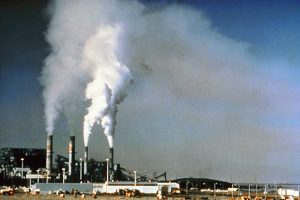We are in a modern, contemporary point of time, hence humanity has the technology to appease all of our energy-related needs via solar power. Solar power is a carbon-free, clean electricity created from the heat of radiation expelled from the sun. The sun produces an extremely large amount of heat and radiation, but almost all of it is lost through the atmosphere, clouds, Earth’s small size, and the great distance between the sun and Earth. Currently, solar energy can be acquired by using either concentrating collectors, flat-plate collectors, or photovoltaic cells. All three can take up a lot of space.
Flat plate-collectors are much more common and have a varying efficiency between 20 and 80 percent. In a very hot and sunny place (near the equator), one collector needs more than 400 square feet for one person’s energy-related needs to be satisfied. In spite of this, the energy we receive is still an immense amount. If this energy is properly utilized, it can completely and fully provide enough power for the whole planet. As of 2011, the worldwide demand for energy was around 363 terawatt-hours per day; this can be met by covering a portion of one percent of the Earth’s land in silicon solar panels, not that we can’t save space by building on the ocean. The third way of collecting solar energy is with photovoltaic cells, which are less common. They produce only 2 watts each, although can collect many kilowatts in large arrays. They have a low efficiency of 15 to 20 percent. Solar panels have been shown to be more effective. Because of all of this, it is predicted that all of mankind’s energy will come from the sun in the future.
Solar panels are typically flat, colored black, and made from aluminum, copper, and steel. Heat is absorbed and then transferred into air or water. The hot air can be immediately used, or transferred to another form. In the form of water, this heat can be stored in an insulated tank. In storage, the carrier fluids are about 150 to 200 degrees Fahrenheit (66-93 °C). Concentrating collectors are a different story, however. They collect heat up to 3,600 degrees Fahrenheit (2.000 °C).
This energy is clean and does not create any pollution; it can effectively put a stop to global warming. Despite what the community says, solar power is actually significantly cheaper than fossil fuels. It also has the potential to stop our dependency on fossil fuels and other nonrenewable resources, cancelling the greenhouse effect. Solar power is overall superior to gasoline, diesel, biodiesel, ethanol, methanol, hydrogen, and electricity. Most of these forms of energy are not a true energy because they need to be converted from other less-convenient sources. Fossil fuels are actually stored forms of potential energy that was made from what was basically solar energy long ago. Solar energy is constantly being generated.
Solar power is energy from the sun’s heat and radiation. It can be used as a clean, efficient, cheap source of energy that does not create any pollution. Solar power is arguably the most powerful energy source we have at our disposal.
How much solar power would it take to power West Fargo?
What are some other methods for storing solar power?
What other forms of true energy are out there?

